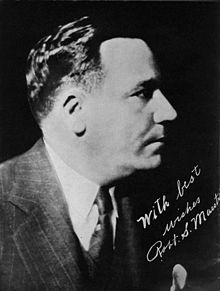Robert Maestri
| Robert Maestri | |
|---|---|

Maestri in photo published in 1937
|
|
| 53rd Mayor of New Orleans, Louisiana | |
|
In office August 18, 1936 – April 4, 1946 |
|
| Preceded by | Jesse S. Cave (acting mayor) |
| Succeeded by | De Lesseps Story Morrison |
| Personal details | |
| Born |
December 11, 1899 New Orleans, Louisiana |
| Died | May 6, 1974 (aged 74) |
Robert Sidney Maestri (December 11, 1889 – May 6, 1974) was mayor of New Orleans from 1936 to 1946 and a key ally of Huey P. Long, Jr., and Earl Kemp Long.
Robert Maestri was born in New Orleans on December 11, 1899, the son of two Italians, Francesco Maestri and Angele (Lacabe) Maestri. He inherited his father’s furniture store at an early age, and quickly built it up into one of the city’s largest. After investing in real estate, Maestri was able to amass a considerable fortune. He also had political ambition, and after allying himself with governor Huey Long, he was appointed to head the state’s Conservation Commission, which allowed him to control production quotas in the state’s oil industry.
He served as conservation commissioner from 1929 to 1936, and was a powerful member of Long’s inner circle. In his autobiography, Huey Long recalls how Maestri volunteered to raise money to fight Long's impeachment by the Louisiana House of Representatives.
Maestri’s association with the Longite political faction brought him to even greater prominence after Huey Long’s death. Long had been involved in a lengthy and destructive feud with New Orleans Mayor T. Semmes Walmsley, and after his death, both sides were interested in ceasing hostilities. In 1936, an agreement was reached between Longite governor Richard Leche and Walmsley’s Regular Democratic Organization, whereby Walmsley would resign as mayor before his term ended and Maestri would take his place as both mayor and as head of the powerful Old Regular political machine. In July 1936, Maestri was nominated as the Democratic candidate for mayor without opposition. After the Republican candidate withdrew in the face of almost certain defeat at the hands of a unified Longite-Old Regular machine, Maestri was acclaimed as mayor of New Orleans on August 17, 1936, without having to face election. A subsequent constitutional amendment was passed by the Longite state legislature cancelling the 1938 municipal election and extending Maestri's term to 1942.
...
Wikipedia
